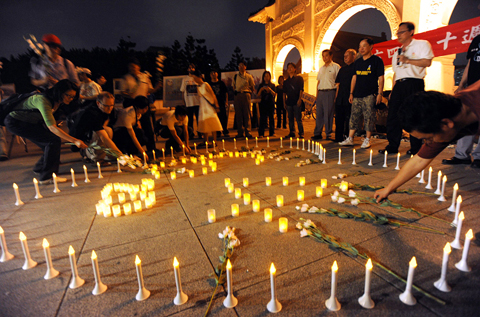The Mainland Democratic Movement Support Group (血脈相連大陸民主運動後援會) is unfamiliar to many in Taiwan’s younger generation.
But following the Tiananmen Square Massacre of June 4, 1989, it was a prominent activist group whose members secretly entered China to try to rescue threatened democracy activists.
Twenty years ago, it had more than 100 members, but that number dwindled over the years to less than a dozen.

PHOTO: WANG YI-SUNG, TAIPEI TIMES
The remaining members got together to organize a series of events in Taipei’s Liberty Square to commemorate the 20th anniversary of the massacre on Wednesday night.
The events began at 6:04pm on Wednesday when former New Party legislators Yao Li-ming (姚立明) and Chien Ta (錢達) led supporters as they rode bikes around National Taiwan Democracy Memorial Hall 20 times.
At around 9pm, Yao, Chien, Chinese democracy activist Cai Lujun (蔡陸軍) and former Democratic Progressive Party chairman Shih Ming-teh (施明德) delivered speeches and sang songs to commemorate the tragedy before staging an overnight sit-in on the square.
Photos taken at Tiananmen in 1989 and a documentary on the massacre were also shown.
Participants lit candles for those who died during the massacre.
Despite heavy rainfall yesterday, several people still remained at Liberty Square.
One volunteer, Ms Liu (劉), sobbed on Wednesday as she told the group’s story.
On the evening of June 3, 1989, students at Beijing’s Tiananmen Square and supporters in Taipei’s Chiang Kai-shek Memorial Hall sang with each other via a radio broadcast, which was abruptly cut off around 11pm, soon after Taiwanese artist Chen Pai-chung broadcast from the square that the Chinese army had entered Beijing. The Chinese Communist Party (CCP) then began their crackdown on the protesters.
Chen called on volunteers to support the democracy movement after returning from China. Later in 1990, the group raised funds from overseas Chinese democracy activists to purchase a secondhand cargo ship, the Goddess of Democracy (民主女神號), hoping to sail between Taiwan and China to broadcast the truth about the incident. Unexpectedly, the Taiwanese government refused to approve the plan.
Tainan businessman Wu Meng-wu (吳孟武) later bought the ship, which is now berthed in Tainan’s Anping Harbor as part of exhibits related to the incident.
The group’s annual commemoration ceremony continued for 10 years but because of dwindling membership, the event was changed to biannual.
Even the song Wound of History (歷史的傷口), sung by a group of Taiwanese singers to show their support, has gradually been forgotten.
The group attempted to contact old members this year, but was unable to track many of them down.
Others said it “was inconvenient to participate in politics again,” as they were doing business with China.
Meanwhile, the lack of interest of both the Taiwanese government and public disheartened members.
“I cannot accept the CCP regime’s method of killing civilians with tanks,” another volunteer, Ms Chung (鍾), said.
“Our aims have been simple over the past 20 years. Although cross-strait relations have improved, we have not altered our original intentions,” she said.
“We do not intend to subvert or eliminate the CCP regime. We just want to awaken the outside world’s most basic humanitarian concerns,” Chung said.

POSITIVE DEVELOPMENT: Japan and the US are expected to hold in-depth discussions on Taiwan-related issues during the meeting next month, Japanese sources said The holding of a Japan-US leaders’ meeting ahead of US President Donald Trump’s visit to China is positive news for Taiwan, former Japan-Taiwan Exchange Association representative Hiroyasu Izumi said yesterday. After the Liberal Democratic Party’s landslide victory in Japan’s House of Representatives election, Japanese Prime Minister Sanae Takaichi is scheduled to visit the US next month, where she is to meet with Trump ahead of the US president’s planned visit to China from March 31 to April 2 for a meeting with Chinese President Xi Jinping (習近平). Japan and the US are expected to hold in-depth discussions on Taiwan-related issues during the

‘LIKE-MINDED PARTNER’: Tako van Popta said it would be inappropriate to delay signing the deal with Taiwan because of China, adding he would promote the issue Canadian senators have stressed Taiwan’s importance for international trade and expressed enthusiasm for ensuring the Taiwan-Canada trade cooperation framework agreement is implemented this year. Representative to Canada Harry Tseng (曾厚仁) in an interview with the Central News Agency (CNA) said he was increasingly uneasy about Ottawa’s delays in signing the agreement, especially as Ottawa has warmed toward Beijing. There are “no negotiations left. Not only [is it] initialed, we have three versions of the text ready: English, French and Mandarin,” Tseng said. “That tells you how close we are to the final signature.” Tseng said that he hoped Canadian Prime Minister Mark Carney

President William Lai (賴清德) yesterday bestowed one of Taiwan’s highest honors on Saint Vincent and the Grenadines (SVG) Ambassador Andrea Clare Bowman in recognition of her contributions to bilateral ties. “By conferring the Order of Brilliant Star with Grand Cordon on Ambassador Bowman today, I want to sincerely thank her, on behalf of the Taiwanese people, for her outstanding contribution to deepening diplomatic ties between Taiwan and SVG,” Lai said at a ceremony held at the Presidential Office in Taipei. He noted that Bowman became SVG’s first ambassador to Taiwan in 2019 and

A man walks past elementary school artworks at the Taipei Lantern Festival in Ximen District yesterday, the first day of the event. The festival is to run from 5pm to 10pm through March 15.